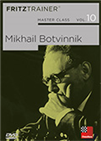A short day at the office
The Lindores Abbey Chess Challenge started on May 18th. Twelve players are taking part. After a three-day preliminary, the best eight players will advance to the deciding knockout section. The time control is 15 minutes for the game, with a 10-second increment per move.
There was a world of difference between Saturday's and Sunday's quarter-finals at the Lindores Abbey online tournament. While both mini-matches were hard-fought confrontations that were only decided in Armageddon on Saturday, Sunday's encounters were over after three games.
Daniil Dubov used his usual brand of chess to score three consecutive wins over the more technical Sergey Karjakin. In game two, for example, Dubov played ...g5 with black as early as move 5, taking his compatriot out of his comfort zone. The ever-fighting Karjakin nevertheless tried to come back in the next game, even after a disconnection on his side seemed to indicate it was time to call it a day and agree to a draw — the former World Championship challenger continued playing and later tweeted:
Before the all-Russian mini-match came to an end, Magnus Carlsen had already secured a victory over Wesley So. The Filipino-born grandmaster defeated the Norwegian in last year's Fischer Random World Championship, but will need to win the next two mini-matches if he wants to knock Carlsen out this time around.

Carlsen 2½:½ So
The result of this mini-match does not reflect how hard-fought it actually was. In game one, the players repeated twelve moves of a Carlsen v Ding Liren game from the 2019 Sinquefield Cup. Although Ding had trouble holding the balance back then, it was clear that So was prepared to face this line.
White heavily damaged his pawn structure, but also had a strong initiative against Black's undeveloped pieces. So kept things under control, until he made a big blunder on move 19:
 Rustam Kasimdzhanov, the FIDE World Champion in 2004, has been extremely successful with the Nimzo-Indian with 4.Qc2 with White and with Black. In over 4 hours of video, Rustam Kasimdzhanov explains all the important ideas, strategies and tricks helped by sample games in which the white side is represented, e.g., by Kasparov, Anand, Kramnik and Ivanchuk as well as the author himself.
Rustam Kasimdzhanov, the FIDE World Champion in 2004, has been extremely successful with the Nimzo-Indian with 4.Qc2 with White and with Black. In over 4 hours of video, Rustam Kasimdzhanov explains all the important ideas, strategies and tricks helped by sample games in which the white side is represented, e.g., by Kasparov, Anand, Kramnik and Ivanchuk as well as the author himself.
So spent over two minutes (in a 15-game encounter) on 19...Rc8, which loses to the forced 20.gxh6+ Kh8 21.Qxc8+ Bxc8 22.Rxc8+ and Black can only save the a8-rook by wasting a number of key tempi. The American had to give up that rook and eventually accepted defeat, with his queen unable to deal with White's active pair of rooks.
Down by one against the world champion, So played the Exchange Variation of the Spanish in game two. He got the initiative in the middlegame, but Carlsen did a good job in handling the complications. So gained an exchange on move 34, but Black had enough counterplay in the endgame thanks to his strong bishop and his passer on the queenside. However, Carlsen gave his opponent a chance to tie the score on move 44:
 Rules of thumb are the key to everything when you are having to set the correct course in a complex endgame. In this final DVD of his series on the endgame, our endgame specialist introduces you to the most important of these rules of thumb.
Rules of thumb are the key to everything when you are having to set the correct course in a complex endgame. In this final DVD of his series on the endgame, our endgame specialist introduces you to the most important of these rules of thumb.
43...a2 was a blunder, as it allowed 44.R5e3 defending the pawn and planning to grab Black's passer on a2 later on — if Black captures the e7-pawn and trades his rook, he will be left without enough counterplay in the technical endgame an exchange down. None of this happened, though, as So played 44.Ra1 immediately, when 44...Bxb3 defends the pawn and keeps things complicated.
In the end, this oversight cost So dearly, as he erred on move 61 and lost the game. The American now needed back-to-back wins to even the score and, instead of fighting on against such an opponent, he decided to agree to a triple repetition as early as move 15 in game three. Carlsen later commented that his rival probably felt he would get better chances by giving up and focusing on winning the next mini-match.
Select an entry from the list to switch between games
Dubov 3:0 Karjakin
Playing white in game one, Dubov repeated a line Pentala Harikrishna had used to draw Karjakin at the Jerusalem Grand Prix last year. True to his style, the younger Russian opted for sharp continuations in the early middlegame and created the sort of imbalanced position he revels in. When an endgame ensued, Dubov was an exchange up, but had to deal with Karjakin's far-advanced passer on the c-file:
 Our experts show, using the games of Botvinnik, how to employ specific openings successfully, which model strategies are present in specific structures, how to find tactical solutions and rules for how to bring endings to a successful conclusion
Our experts show, using the games of Botvinnik, how to employ specific openings successfully, which model strategies are present in specific structures, how to find tactical solutions and rules for how to bring endings to a successful conclusion
White gave up his rook for Black's bishop and pawn, entering a favourable knight ending. Karjakin did all he could, but was forced to accept defeat on move 72.
Dubov was leading on the scoreboard, but did not shy away from entering another sharp struggle in game two:
The 2018 world rapid champion continued 5...g5 6.a4 g4 and naturally castled long later in the game. His strategy worked marvels, as his opponent was never able to create the kind of stable position in which his strengths come to the fore. Dubov later explained why he chose his 13th move, shedding light on his thinking process:
After 13.g3, the computer considers d5, g2 or g6 as the best escaping squares for the attacked knight. Dubov later confessed that he knew his 13...Ne6 was not the best alternative, but justified his choice by noting that he had a plan after this move. This practical approach served him well once again, as he got a quick 21-move win.
Needing a win, Karjakin played the King's Indian in game three. Dubov did not make waves given the circumstances — he got a clear positional advantage and went on to score a third consecutive victory.
Select an entry from the list to switch between games
 The most popular chess program offers you everything you will need as a dedicated chess enthusiast, with innovative training methods for amateurs and professionals alike.
The most popular chess program offers you everything you will need as a dedicated chess enthusiast, with innovative training methods for amateurs and professionals alike.
Links
























